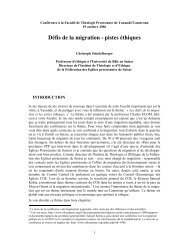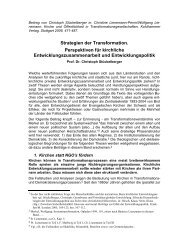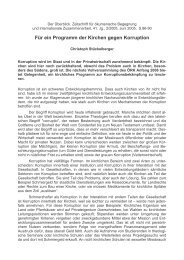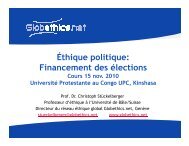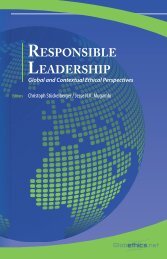BREAK THE CHAINS OF OPPRESION AND THE YOKE OF ...
BREAK THE CHAINS OF OPPRESION AND THE YOKE OF ...
BREAK THE CHAINS OF OPPRESION AND THE YOKE OF ...
You also want an ePaper? Increase the reach of your titles
YUMPU automatically turns print PDFs into web optimized ePapers that Google loves.
EMpire ty. 13 And those who confine their analysis to describing injustice and inhumanity<br />
do not get at the actual structures, do not unravel the internal system of<br />
these events – and do not need to discover their own share in these situations or<br />
self-critically ask questions about their own responsibility.<br />
These different approaches have frequently sparked off disagreement and conflict<br />
at ecumenical assemblies – e.g. when people from the South report on their<br />
real-life, often difficult situations and people from the North at the same time<br />
supply more or less abstract analyses and instructions for action without taking a<br />
moment to sympathize before getting down to their policy agendas. With respect<br />
to the very helpful discussion on global power structures, this thinking in<br />
opposites –“us” and “them” – has generated friction and resistance that has at<br />
least slowed down a more in-depth discussion about the imperial structures of<br />
globalization. That was due to the different forms of response, but also to the<br />
imprecise semantics of some of the statements from the South.<br />
One example of how carelessly complex political structures can be stirred into an<br />
ideological mishmash by the concept of empire is the Faith Stance of the participants<br />
at the Manila Consultation (2005) describing the political situation in<br />
North Korea:<br />
North Korea’s economy, already weakened by the ravages of neoliberal globalization,<br />
has been pushed to the brink by the US trade embargo and economic sanctions. (…).<br />
Refusing to hold bilateral talks or to normalize relations with North Korea, the US<br />
has demonized the country, calling it part of the “axis of evil” in hopes of forcing a<br />
regime change. This has only provoked North Korea to go nuclear, in turn heightening<br />
tensions and fuelling the arms race in North East Asia. 14<br />
What kind of serious reply is possible to that? Whoever turns offenders into vic-<br />
tims in this way misuses � �the real �victims and does �not �allow<br />
the reader to undertake<br />
a sympathetic and careful consideration of their situation. This instrumentalizes<br />
the victims and is thus a double victimization. Anyone who simplifies<br />
North Korea’s criminal policy toward its own people, calling it reaction to provocation,<br />
uses a stereotype that is unthinking and harmful. In terms of political science,<br />
the Manila Paper contains a highly questionable analysis of real structures<br />
that barely conceals its inflammatory intention under the guise of the theological<br />
category of “empire”.<br />
13 Cameroonian political scientist Munasu Duala-M’bedy describes in his book Xenologie<br />
– Die Wissenschaft vom Fremden und die Verdrängung der Humanität in der Anthropologie<br />
(Freiburg/Munich1977) the involvement of former colonial powers in<br />
the contexts of perceiving “the strange as their own” and their flight from empathy into<br />
rationalization – leading to profound problems of incomprehension that have impacted<br />
even on the ethnographic accounts of academic anthropology.<br />
14 An Ecumenical Faith Stance Against Global Empire For A Liberated Earth Community.<br />
http://warc.jalb.de/warcajsp/side.jsp?news_id=1166&navi=45.<br />
������������������������������������������<br />
� � � � � � ��������������������<br />
�<br />
76<br />
– Empire - Provocation with a Perspective –



